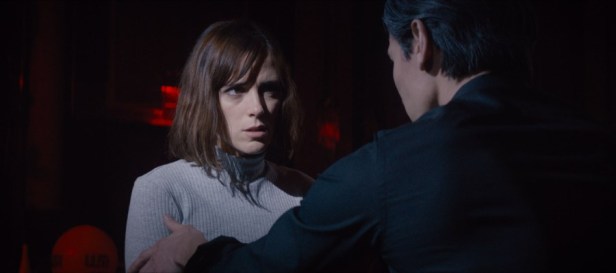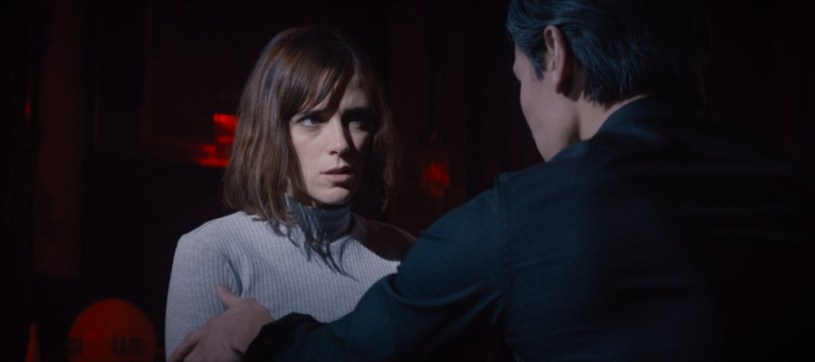
Trauma is at the center of Housewife, the latest gory supernatural horror film by Turkish filmmaker Can Evrenol (Baskin). The film opens with a sequence in which a young girl — Holly — witnesses her mother (Defne Halman) murder her older sister Hazel and her father. Filmed in frenetic, mildly hallucinatory fashion, this brutal family slaying starts the film off with a bang.
The memory of that night haunts Holly into adulthood (where she is played by French actress Clémentine Poidatz). Twenty years later, Holly is now married to a talented, arrogant artist named Timucin Erguvan (Ali Aksöz), but she continues to be plagued by vivid memories and prophetic dreams. For the most part Tim is sympathetic to her PTSD, but it is affecting their relationship, particularly his desire to have children. The plot kicks into high gear when Holly’s former friend and lover Valery (Alicia Kapudag) arrives at the house unexpectedly after a two year absence. After patching up their differences with a threesome, Valery encourages Holly to attend a seminar hosted by the Umbrella of Love and Mind, a mysterious organization led by a charismatic leader, Bruce O’Hara (David Sakurai), whom Valery believes can help Holly.
It’s not always clear where Housewife is going early on, but by the time the trio arrives at the swanky event and a troop of cultish devotees enter the hall in hoods, the jig is up. Evrenol and co-writer Cem Özüduru don’t make any effort to disguise the fact that Umbrella and O’Hara have awful plans for Holly; instead the screenplay and Evrenol’s direction play up the film’s dream-like logic to continually question what is real and what is imagined.
Özüduru and Evrenol wisely use the first interaction between O’Hara and Holly to lay out the foundation for the remainder of the film. After arriving on-stage to a reception worthy of a rock star or motivational speaker, O’Hara delivers a rousing speech to his followers about a “special guest”. He approaches Holly and, despite her protests, places his hands on her head, plunging her into a waking dream that finds her at home as her toilet begins overflowing with blood. The lighting in the dream — a literal spotlight on Holly — is carried over from the convention hall, an effective visual shorthand to reinforce Holly’s famed status in the group while also shrouding the terrifying imagery in darkness. When Holly awakens screaming, O’Hara’s nose is bleeding and the crowd has delivered him a standing ovation.

While the goal of this encounter is kept deliberately unclear, it becomes the first in a series of encounters in which David probes Holly’s mind and reshapes it using astral projection. Despite Tim’s growing reservations, Holly submits to O’Hara’s machinations willingly, claiming that the first experience has helped her overcome her concerns about motherhood. Things take a turn, however, when O’Hara shows Holly something from the night of her sister’s murder that terrifies her.
At this point (approximately just past the half way point of the film) Housewife shifts into a surreal nightmare in which it is uncertain if Holly is trapped in waking dreams or if there really are malevolent forces pursuing her. Items of value are stolen, bloody apparitions loom threateningly and the violence escalates increasingly until the final climactic setpiece unleashes pure, icky delicious gore.
For fans of Baskin, the early parts of Housewife may move a little slowly, but the payoff lands Evrenol’s latest in similar narrative and FX territory (casual horror fans: consider that a warning). Housewife is rarely frightening, but it does get under your skin, particularly the gruesome final act when the gag-inducing practical effects feed into an unsettling final reveal.

Evrenol wisely doesn’t overplay the nightmarish imagery, allowing the film to unspool somewhere between reality and dream right up until the climax. Poidatz — saddled with a role that requires her to slowly unravel over the course of the film — plays Holly in a deliberately understated and slightly dazed fashion. The standout, however, is David Sakurai, who successfully channels a charming and threatening cult leader. While O’Hara’s malicious intent is never in doubt, Sakurai imbues the man with enough charm that it is understandable how he wields so much power and influence.
Evrenol’s visual approach is deeply indebted to dream/nightmare logic, but it is all in service to Housewife‘s thematic interest in exploring female roles and the lasting impact of trauma. The film makes its feminist agenda clear by aligning Holly’s traumatic childhood with the roles she has been forced into as an adult: muse, housewife, and potential mother. As the film progresses, the latter role becomes increasingly important; not only do the horrific events of Holly’s past inform her reluctance to become a mother, her trauma is tied to a matrilineal legacy that feeds the cult’s fascination with her.
In this way Housewife is implicitly interested in how roles and destiny are imposed on women – often against their will* and, in this case, by men (both Tim and O’Hara claim ownership over Holly’s free will and body, albeit in different ways). By tackling issues of female agency and trauma, Housewife sets itself apart from other horror films that focus on cults and, sadly, feels more timely and relevant than ever.
*Housewife shares a number of similarities with Ari Aster’s Hereditary from earlier this year, though this film is far less nuanced and subversive.
Score: 3.5/5
Housewife is available on VOD, Digital and DVD on October 2, 2018.


Thannk you for being you
LikeLike